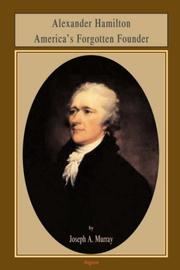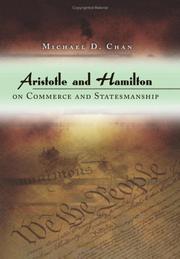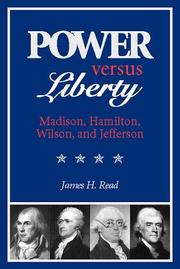| Listing 1 - 10 of 16 | << page >> |
Sort by
|

ISBN: 9786611398224 1281398225 087586502X 9780875865027 0875865003 9780875865003 0875865011 9780875865010 9781281398222 9780875865003 9780875865010 Year: 2007 Publisher: New York Algora Pub.
Abstract | Keywords | Export | Availability | Bookmark
 Loading...
Loading...Choose an application
- Reference Manager
- EndNote
- RefWorks (Direct export to RefWorks)
Alexander Hamilton: America's Forgotten Founder describes the character and achievements of a man who was instrumental in casting the form of our government and especially its strong financial structure. His financial innovations renewed the public credit when war debts threatened to swamp the fledgling economy, provided a stable currency system and established a federal revenue system. Hamilton s involvement in the foreign affairs of the new republic assured its unity, sovereignty and rapid economic growth. Born in the West Indies, Alexander Hamilton migrated to America when he was fifteen ye
Statesmen --- Hamilton, Alexander, --- Camillus, --- No Jacobin, --- Pacificus, --- Philo Camillus, --- Phocion, --- Han-mi-erh-teng, Ya-li-shan-ta, --- Gamilʹton, Aleksandr, --- Hamilton, Aleksander, --- Hamilton, A. --- Khamiltŭn, Aleksandŭr, --- Crassus, Lucius, --- Americanus, --- Influence. --- United States --- Politics and government

ISBN: 9780521834858 9781107326033 9780521708746 9781107089600 1107089603 1107326036 9781107095953 1107095956 0521834856 1107086027 9781107086029 1316086143 9781316086148 0521708745 1107101557 9781107101555 1107092825 9781107092822 1299706231 Year: 2004 Publisher: Cambridge, UK New York Cambridge University Press
Abstract | Keywords | Export | Availability | Bookmark
 Loading...
Loading...Choose an application
- Reference Manager
- EndNote
- RefWorks (Direct export to RefWorks)
Alexander Hamilton rose from his humble beginnings as an illegitimate West Indian orphan and emigrant to become the premier statebuilder and strategic thinker of the American Founding generation. This is the first detailed narrative study of his foreign policy role and ideas to appear in more than thirty years. It focuses on Hamilton's controversial activities as a key member of President George Washington's cabinet and as an aspiring military leader in the 1790s, a decade of profound division over the shape and powers of the Federal government, and US policy toward the warring powers of Europe. Drawing parallels between Hamilton and the Florentine diplomatist and thinker, Niccolò Machiavelli, prize-winning historian John Lamberton Harper offers an insightful and accessible account of the origins of Hamilton's outlook, his bitterly personal rivalries with Thomas Jefferson and John Adams, and his indispensable part in designing and implementing US foreign policy.
Hamilton, Alexander --- Views on international relations --- Statesmen --- United States --- Biography --- Foreign relations --- Revolution, 1775-1783 --- 1783-1815 --- Philosophy --- Machiavelli, Niccolo --- Hamilton, Alexander, --- Machiavelli, Niccolò, --- Camillus, --- No Jacobin, --- Pacificus, --- Philo Camillus, --- Phocion, --- Han-mi-erh-teng, Ya-li-shan-ta, --- Gamilʹton, Aleksandr, --- Hamilton, Aleksander, --- Hamilton, A. --- Khamiltŭn, Aleksandŭr, --- Crassus, Lucius, --- Americanus, --- Philosophy. --- History --- Diplomacy --- Diplomatic history --- マキアヴェルリ --- Arts and Humanities --- Machiavelli, Niccolo,

ISBN: 0742569748 0842028781 9780742569744 0842028773 9780842028776 9780842028783 1299782027 9781299782020 Year: 2002 Publisher: Wilmington, Del. SR Books
Abstract | Keywords | Export | Availability | Bookmark
 Loading...
Loading...Choose an application
- Reference Manager
- EndNote
- RefWorks (Direct export to RefWorks)
Of all of the Founding Fathers of the American republic none, with the possible exception of Thomas Jefferson, has evoked more passions and aroused more controversy than Alexander Hamilton. In this absorbing new biography, eminent historian Lawrence Kaplan examines Hamilton's conception of America's role in the world and the foreign policies that followed from his vision. Kaplan looks at how Hamilton acted upon his views in shaping the course of American foreign relations. The author provides a focused, accessible biography of Hamilton and a nuanced assessment of his impact on Federalist
Statesmen --- Hamilton, Alexander, --- Camillus, --- No Jacobin, --- Pacificus, --- Philo Camillus, --- Phocion, --- Han-mi-erh-teng, Ya-li-shan-ta, --- Gamilʹton, Aleksandr, --- Hamilton, Aleksander, --- Hamilton, A. --- Khamiltŭn, Aleksandŭr, --- Crassus, Lucius, --- Americanus, --- United States --- Foreign relations --- History --- Diplomacy --- Diplomatic history --- #SBIB:328H31 --- #SBIB:97G --- Instellingen en beleid: VSA / USA --- Geschiedenis van Noord-Amerika --- Great Britain --- Hamilton, Alexander --- 해밀톤
Book
ISBN: 0819578282 9780819578280 0819578274 9780819578273 Year: 2018 Publisher: Middletown, Connecticut Wesleyan University Press
Abstract | Keywords | Export | Availability | Bookmark
 Loading...
Loading...Choose an application
- Reference Manager
- EndNote
- RefWorks (Direct export to RefWorks)
Engaging overview with first-person accounts of America's most infamous duel.
Hamilton, Alexander, --- Burr, Aaron, --- Camillus, --- No Jacobin, --- Pacificus, --- Philo Camillus, --- Phocion, --- Han-mi-erh-teng, Ya-li-shan-ta, --- Gamilʹton, Aleksandr, --- Hamilton, Aleksander, --- Hamilton, A. --- Khamiltŭn, Aleksandŭr, --- Crassus, Lucius, --- Americanus, --- United States --- Politics and government --- Burr-Hamilton Duel, Weehawken, N.J., 1804. --- Dueling --- Duels --- Fighting --- Chivalry --- Martial arts --- Combat --- Wager of battle --- Burr-Hamilton Duel --- Hamilton-Burr Duel, Weehawken, N.J., 1804
Book

ISBN: 0813590310 0813590337 9780813590318 9780813590332 9780813590301 0813590302 9780813590295 0813590299 Year: 2018 Publisher: New Brunswick, NJ
Abstract | Keywords | Export | Availability | Bookmark
 Loading...
Loading...Choose an application
- Reference Manager
- EndNote
- RefWorks (Direct export to RefWorks)
America has gone Hamilton crazy. Lin-Manuel Miranda's Tony-winning musical has spawned sold-out performances, a triple platinum cast album, and a score so catchy that it is being used to teach U.S. history in classrooms across the country. But just how historically accurate is Hamilton? And how is the show itself making history? Historians on Hamilton brings together a collection of top scholars to explain the Hamilton phenomenon and explore what it might mean for our understanding of America's history. The contributors examine what the musical got right, what it got wrong, and why it matters. Does Hamilton's hip-hop take on the Founding Fathers misrepresent our nation's past, or does it offer a bold positive vision for our nation's future? Can a musical so unabashedly contemporary and deliberately anachronistic still communicate historical truths about American culture and politics? And is Hamilton as revolutionary as its creators and many commentators claim? Perfect for students, teachers, theatre fans, hip-hop heads, and history buffs alike, these short and lively essays examine why Hamilton became an Obama-era sensation and consider its continued relevance in the age of Trump. Whether you are a fan or a skeptic, you will come away from this collection with a new appreciation for the meaning and importance of the Hamilton phenomenon.
Alexander Hamilton. --- Hamilaria. --- Hamilton. --- Lin-Manuel Miranda. --- broadway. --- hip hop. --- hip-hop. --- history. --- musical. --- rap. --- theater. --- HISTORY / General. --- Miranda, Lin-Manuel, --- Hamilton, Alexander, --- Camillus, --- No Jacobin, --- Pacificus, --- Philo Camillus, --- Phocion, --- Han-mi-erh-teng, Ya-li-shan-ta, --- Gamilʹton, Aleksandr, --- Hamilton, Aleksander, --- Hamilton, A. --- Khamiltŭn, Aleksandŭr, --- Crassus, Lucius, --- Americanus, --- Chernow, Ron. --- Drama --- History as a science --- Miranda, Lin-Manuel
Book
ISBN: 0674066928 0674067665 9780674067660 0674071352 9780674066922 9780674071353 Year: 2012 Publisher: Cambridge, MA
Abstract | Keywords | Export | Availability | Bookmark
 Loading...
Loading...Choose an application
- Reference Manager
- EndNote
- RefWorks (Direct export to RefWorks)
In 1776 the United States government started out on a shoestring and quickly went bankrupt fighting its War of Independence against Britain. At the war's end, the national government owed tremendous sums to foreign creditors and its own citizens. But lacking the power to tax, it had no means to repay them. The Founders and Finance is the first book to tell the story of how foreign-born financial specialists-immigrants-solved the fiscal crisis and set the United States on a path to long-term economic success. Pulitzer Prize-winning author Thomas K. McCraw analyzes the skills and worldliness of Alexander Hamilton (from the Danish Virgin Islands), Albert Gallatin (from the Republic of Geneva), and other immigrant founders who guided the nation to prosperity. Their expertise with liquid capital far exceeded that of native-born plantation owners Washington, Jefferson, and Madison, who well understood the management of land and slaves but had only a vague knowledge of financial instruments-currencies, stocks, and bonds. The very rootlessness of America's immigrant leaders gave them a better understanding of money, credit, and banks, and the way each could be made to serve the public good. The remarkable financial innovations designed by Hamilton, Gallatin, and other immigrants enabled the United States to control its debts, to pay for the Louisiana Purchase of 1803, and-barely-to fight the War of 1812, which preserved the nation's hard-won independence from Britain.
Finance, Public --- Monetary policy --- Political Science --- Law, Politics & Government --- Public Finance --- History. --- History --- Gallatin, Albert, --- Hamilton, Alexander, --- United States. --- United States --- Economic policy. --- Politics and government --- Camillus, --- No Jacobin, --- Pacificus, --- Philo Camillus, --- Phocion, --- Han-mi-erh-teng, Ya-li-shan-ta, --- Gamilʹton, Aleksandr, --- Hamilton, Aleksander, --- Hamilton, A. --- Khamiltŭn, Aleksandŭr, --- Crassus, Lucius, --- Gallatin, Abraham Alfonse Albert, --- Gallatin, Abraham Albert Alphonse, --- A. G. --- G., A. --- Americanus, --- American Revolution (1775-1783) --- E-books
Book
ISBN: 9780817392567 0817392564 9780817320164 0817320164 Year: 2019 Publisher: Tuscaloosa
Abstract | Keywords | Export | Availability | Bookmark
 Loading...
Loading...Choose an application
- Reference Manager
- EndNote
- RefWorks (Direct export to RefWorks)
"Hamilton's Public Administration deals with Hamilton as both a founder of the American republic, steeped in the currents of political philosophy and science of his day, and as its chief administrative theorist and craftsman, deeply involved in establishing the early institutions and policies that would bring his interpretation of the written Constitution to life. Accordingly, this book addresses (1) the complex mix of classical and modern ideas which informed his vision of a modern commercial and administrative republic, (2) the administrative ideas, institutions and practices which flowed from that vision, and (3) the substantive policies he deemed essential to its realization. The analysis flows from immersion in his extant papers (reports, letters, pamphlets, and essays running to thirty-one volumes in total) and many thematic and biographical works on his life. It aims to provide a comprehensive explanation of his theoretical contributions, and a richly detailed account of his ideas and practices in historical context"--
Political science --- Republicanism --- Public administration --- Administration, Public --- Delivery of government services --- Government services, Delivery of --- Public management --- Public sector management --- Administrative law --- Decentralization in government --- Local government --- Public officers --- History. --- Philosophy. --- Hamilton, Alexander, --- Camillus, --- No Jacobin, --- Pacificus, --- Philo Camillus, --- Phocion, --- Han-mi-erh-teng, Ya-li-shan-ta, --- Gamilʹton, Aleksandr, --- Hamilton, Aleksander, --- Hamilton, A. --- Khamiltŭn, Aleksandŭr, --- Crassus, Lucius, --- Americanus, --- Political and social views. --- United States --- Politics and government

ISBN: 0826216390 0826265162 9780826265166 9780826216397 Year: 2006 Publisher: Columbia : University of Missouri Press,
Abstract | Keywords | Export | Availability | Bookmark
 Loading...
Loading...Choose an application
- Reference Manager
- EndNote
- RefWorks (Direct export to RefWorks)
"Examines Alexander Hamilton's political economy in relation to Aristotle's classical views of economics, as presented in his Politics, and finds shared support of commerce in pursuit of a regime's or democracy's wider goals"--Provided by publisher.
BUSINESS & ECONOMICS --- Economics / Theory --- Economics --- Political aspects. --- Hamilton, Alexander, --- Aristotle. --- Economic theory --- Political economy --- Aristoteles --- Aristote --- Aristotle --- Aristotile --- Camillus, --- No Jacobin, --- Pacificus, --- Philo Camillus, --- Phocion, --- Han-mi-erh-teng, Ya-li-shan-ta, --- Gamilʹton, Aleksandr, --- Hamilton, Aleksander, --- Hamilton, A. --- Khamiltŭn, Aleksandŭr, --- Crassus, Lucius, --- Social sciences --- Economic man --- Americanus, --- Arisṭāṭṭil --- Aristo, --- Aristotel --- Aristotele --- Aristóteles, --- Aristòtil --- Arisṭū --- Arisṭūṭālīs --- Arisutoteresu --- Arystoteles --- Ya-li-shih-to-te --- Ya-li-ssu-to-te --- Yalishiduode --- Yalisiduode --- Ἀριστοτέλης --- Αριστοτέλης --- Аристотел --- ארסטו --- אריםטו --- אריסטו --- אריסטוטלס --- אריסטוטלוס --- אריסטוטליס --- أرسطاطاليس --- أرسططاليس --- أرسطو --- أرسطوطالس --- أرسطوطاليس --- ابن رشد --- اريسطو --- Pseudo Aristotele --- Pseudo-Aristotle --- アリストテレス

ISBN: 1283875403 081392460X 9780813924601 0813919126 9780813919126 0813919118 9780813919119 0813919118 9780813919119 Year: 2000 Publisher: Charlottesville University Press of Virginia
Abstract | Keywords | Export | Availability | Bookmark
 Loading...
Loading...Choose an application
- Reference Manager
- EndNote
- RefWorks (Direct export to RefWorks)
Does every increase in the power of government entail a loss of liberty for the people? James H. Read examines how four key Founders--James Madison, Alexander Hamilton, James Wilson, and Thomas Jefferson--wrestled with this question during the first two decades of the American Republic. Power versus Liberty reconstructs a four-way conversation--sometimes respectful, sometimes shrill--that touched on the most important issues facing the new nation: the Constitution, the Bill of Rights, federal authority versus states' rights, freedom of the press, the controversial Bank of the United States, the relation between nationalism and democracy, and the elusive meaning of "the consent of the governed."Each of the men whose thought Read considers differed on these key questions. Jefferson believed that every increase in the power of government came at the expense of liberty: energetic governments, he insisted, are always oppressive. Madison believed that this view was too simple, that liberty can be threatened either by too much or too little governmental power. Hamilton and Wilson likewise rejected the Jeffersonian view of power and liberty but disagreed with Madison and with each other. The question of how to reconcile energetic government with the liberty of citizens is as timely today as it was in the first decades of the Republic. It pervades our political discourse and colors our readings of events from the confrontation at Waco to the Oklahoma City bombing to Congressional debate over how to spend the government surplus. While the rhetoric of both major political parties seems to posit a direct relationship between the size of our government and the scope of our political freedoms, the debates of Madison, Hamilton, Wilson, and Jefferson confound such simple dichotomies. As Read concludes, the relation between power and liberty is inherently complex.
Liberty. --- Authority. --- Power (Social sciences) --- Political science --- Civil liberty --- Emancipation --- Freedom --- Liberation --- Personal liberty --- Democracy --- Natural law --- Equality --- Libertarianism --- Social control --- Authoritarianism --- Consensus (Social sciences) --- Empowerment (Social sciences) --- Political power --- Exchange theory (Sociology) --- Social sciences --- Sociology --- History --- Jefferson, Thomas, --- Wilson, James, --- Hamilton, Alexander, --- Madison, James, --- Camillus, --- No Jacobin, --- Pacificus, --- Philo Camillus, --- Phocion, --- Han-mi-erh-teng, Ya-li-shan-ta, --- Gamilʹton, Aleksandr, --- Hamilton, Aleksander, --- Hamilton, A. --- Khamiltŭn, Aleksandŭr, --- Crassus, Lucius, --- Americanus, --- Helvidius, --- Mei-ti-sen, Chan-mu-shih, --- Mėdison, Dzheĭms, --- Madison, G., --- Madisŭn, Dzheĭms,
Book
ISBN: 0742548163 9780742548169 9780742548152 0742548155 9781306196901 1306196906 Year: 2014 Publisher: Lanham, Maryland
Abstract | Keywords | Export | Availability | Bookmark
 Loading...
Loading...Choose an application
- Reference Manager
- EndNote
- RefWorks (Direct export to RefWorks)
Jason Frank's Publius and Political Imagination is the first volume of the Modernity and Political Thought series to take as its focus not a single author, but collaboration between political philosophers, in this very special case the collective known by the pseudonym: Publius.
Constitutional history --- Hamilton, Alexander, --- Madison, James, --- Jay, John, --- Che-shih, Yüeh-han, --- Citizen of New York, --- Jay, J. --- Dzheĭ, Dzhon, --- Helvidius, --- Mei-ti-sen, Chan-mu-shih, --- Mėdison, Dzheĭms, --- Madison, G., --- Madisŭn, Dzheĭms, --- Camillus, --- No Jacobin, --- Pacificus, --- Philo Camillus, --- Phocion, --- Han-mi-erh-teng, Ya-li-shan-ta, --- Gamilʹton, Aleksandr, --- Hamilton, Aleksander, --- Hamilton, A. --- Khamiltŭn, Aleksandŭr, --- Crassus, Lucius, --- Americanus, --- Political and social views. --- Federalist. --- Federalist papers --- Federalist, or, The new Constitution --- United States --- Politics and government --- Philosophy.
| Listing 1 - 10 of 16 | << page >> |
Sort by
|

 Search
Search Feedback
Feedback About UniCat
About UniCat  Help
Help News
News